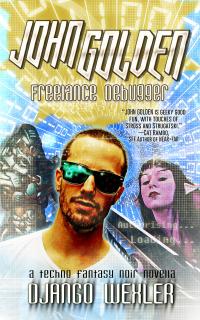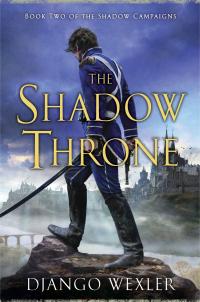
 I am excited to welcome author Django Wexler, who is celebrating the release of his latest novel, John Golden: Freelance Debugger.
I am excited to welcome author Django Wexler, who is celebrating the release of his latest novel, John Golden: Freelance Debugger.
FREELANCE DEBUGGER
John Golden is a debugger: he goes inside the computer systems of his corporate clients to exterminate the gremlins, sprites, and other fairies that take up residence. But when he gets a frantic call from Serpentine Systems, a top-of-the-line anti-fairy security company, John finds out he’s on much more than a simple smurf-punting expedition.
With the help of his sarcastic little sister Sarah (currently incarnated in the form of a Dell Inspiron) and a paranoid system administrator, John tackles Serpentine’s fairy problem. But the rabbit hole goes deeper than he thinks, and with the security of all of company’s clients in danger, there’s more at stake this time than John’s paycheck!
_____________________________________________
The Magic of John Golden
 When I start designing the magic system for a story, I generally consider two things. First, the magic system must be in some sense self-consistent — it must follow some kind of rules, even if those rules aren’t apparent to the reader. I often try to give it a kind of metaphysical underpinning, since deriving the rules from first principles, so to speak, automatically gives them a sense of unity and consistency beyond just a set of arbitrary restrictions and abilities.
When I start designing the magic system for a story, I generally consider two things. First, the magic system must be in some sense self-consistent — it must follow some kind of rules, even if those rules aren’t apparent to the reader. I often try to give it a kind of metaphysical underpinning, since deriving the rules from first principles, so to speak, automatically gives them a sense of unity and consistency beyond just a set of arbitrary restrictions and abilities.
Second, the magic system has to serve the story. It’s no good having the most complex, well-thought-out magic system in the world if the nature of it makes telling the story you want to tell difficult. This is trickier than it sounds, because it’s often in conflict with the “follow a set of rules” idea. Magic that does whatever you need it do (and, more importantly, fails whenever you need it to fail) can be very convenient from a storytelling point of view, but in the context of the type of story I’m trying to tell, it generally doesn’t make the readers happy.
(Aside: It’s not the only kind of story one can tell, of course. The classic example is the magic of fairy tales, which follows a kind of narrative or dramatic logic rather than “rules” in the sense that I mean them. That creates a story with a very different tone, though, and it’s not what I usually go for.)
It’s usually pretty easy to tell when the magic system and story are poorly matched, because you start having to invent exceptions and restrictions on the fly. I think of this as “Why don’t they…?” syndrome, because you’re answering questions like “Why don’t they just fly over the canyon?” “Why don’t they just put the monster to sleep?” And to keep the plot on track, you have to add arbitrary rules — trolls are immune to sleep spells, fly spells don’t work on the night of the full moon, and so on. Too much of this and your world design becomes a mess.
So, how did this work for John Golden? I started with a vague idea of what I wanted — John goes into computers, somehow, and rids them of annoying magical creatures. Not physically inside them, though, since that seemed like it could get messy. Some questions are answered by the needs of the story. For example: how dangerous is it inside? Not very, because I needed to keep the right tone — John is supposed to be a happy-go-lucky IT troubleshooter, not a grizzled mercenary who laughs at death. So he retains the option to jump back out at any time if things get hairy. Similarly: how much control does he have of his environment once he’s inside? Some, so that he can do “magic”, create weapons and armor, and so on, but not a lot, because then things would be too easy for him.
With the basic parameters laid out, you can start extrapolating the rules outward. If John is going to go inside computers to fight fairies, where do the fairies come from? The obvious analogue, in terms of nasty little things that live inside computers, is with viruses, so I tweaked the language and concepts of convention computer security to fit the sitting with antifae, direwalls, and so on. I even invented a whole metaphysical structure (which gets a bit lengthy, so that will have to wait for another article) that explains what the fairies actually are and how they go about their business. Almost none of this actually makes it into the story, but the consequences do, and having the structure there makes sure that those consequences are logically consistent.
The hardest part is when the two goals conflict. Having established that John can bail out at any time, the challenge comes in raising the stakes, making it so that this time it’s not just a typical job. It’s always tempting to just change the rules arbitrarily, but if you find a solution that fits more naturally in the fabric of the story, the result is more satisfying. I hope I managed it — you can read John Golden: Freelance Debugger and let me know!
______________________
Meet Django Wexler!
Django Wexler graduated from Carnegie Mellon University in Pittsburgh with degrees in creative writing and computer science, and worked for the university in artificial intelligence research. Eventually he migrated to Microsoft in Seattle, where he now lives with two cats and a teetering mountain of books. When not planning Shadow Campaigns, he wrangles computers, paints tiny soldiers, and plays games of all sorts.
 Contact Info: Website | Blog | Facebook | Twitter | Google+ | GoodReads
Contact Info: Website | Blog | Facebook | Twitter | Google+ | GoodReads
Want to purchase Django Wexler’s novels?
Shadow Campaigns
- The Penitent Damned
- The Thousand Names
- The Shadow Throne (July 1, 2014)
Memories of Empire
Shinigami
The Forbidden Library (April 15, 2014)
John Golden: Freelance Debugger
_____________________________________________
Thank you Django for taking the time to stop by Literary Escapism!

I’m looking forward to reading this. Fortunately it’s so short so I should be able to read it pretty quickly, but at the same time, I more than half expect to wish it wasn’t so short at the end. :)